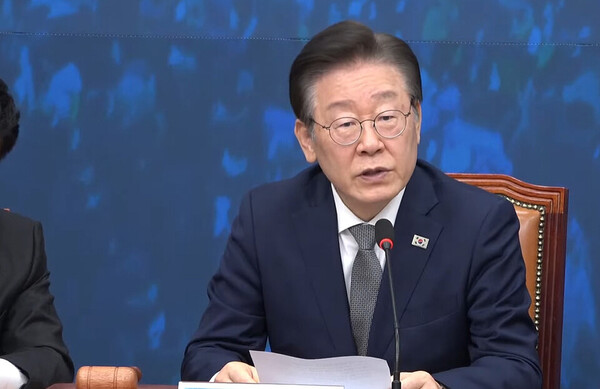Lee Jae-myung, the presidential frontrunner of the Democratic Party of Korea (DPK), pledged Tuesday to seek social consensus—particularly with the medical community—on setting the annual medical school admission quota, a contentious issue that former President Yoon Suk Yeol was criticized for mishandling. He also vowed to establish public medical schools to strengthen the public healthcare sector.
“I will create a country where no one has to worry about getting sick and a society where people can get proper medical treatment,” Lee said on his Facebook page on Tuesday morning.

Lee said he would “rationalize” medical school quotas, noting that the year-long conflict between the medical community and the government -- and the resulting disruptions in surgeries and emergency care -- had caused pain for everyone, including patients.
He was referring to the mass resignation of trainee doctors in February 2024, following the government’s abrupt announcement of a plan to increase the annual medical school admission quota by 2,000 starting in 2025.
Most of the trainee physicians have not returned to their training hospitals and have instead taken positions at other medical institutions. The situation remains unresolved. Many medical school students are still on leave.
"It's time to end the conflict, confrontation, and politics. We need to put people's lives and health at the center of everything we do," he said.
The former Democratic Party of Korea leader also proposed establishing public medical schools and expanding state-run hospitals to strengthen the public healthcare sector.
“We will establish public medical schools to train public, essential, and regional medical personnel and expand public hospitals with a next-generation public healthcare system based on digital infrastructure,” Lee said.
"We will reduce healthcare disparities between regions and expand support for local medical centers to develop them into public healthcare hubs. Essential medical care, such as emergency services, childbirth, and trauma treatment, will be the responsibility of the state."
Lee also vowed to reform the national health insurance system to ensure financial sustainability and more efficient use of healthcare funds, while prioritizing patient rights and safety.
He acknowledged that Korea has built a high-quality healthcare system in a relatively short period, largely due to the dedication of healthcare professionals who have worked tirelessly. However, he pointed out persistent gaps in access to care.
“Despite improvements in health insurance coverage, there are still disparities in healthcare services depending on where you live and whether you have private insurance,” he said. “If you get sick, there's often no hospital nearby, and the barriers to care keep rising. The common sense of ‘if you're sick, go to the hospital’ needs to be restored.”
“Access to healthcare is more dependent on local conditions, income levels, and provider distribution than on actual patient needs,” he added. “We need healthcare reform that prioritizes patient needs and safety, and a comprehensive overhaul that extends to nursing and care services.”
Related articles
- Education Ministry sets 2026 medical school admission quota at 3,058
- After Yoon's exit, Korean doctors press government, lawmakers to fix healthcare
- Medical community welcomes Yoon’s removal, urges end to misguided healthcare policies
- KMA decides to join panel for estimating medical workforce demand and supply
- Presidential candidates: Who will rewrite Korea's healthcare playbook?
- Bill proposed to cut mandatory service for public health, military doctors from 3 to 2 years
- Government considers rehiring resigned trainee doctors at teaching hospitals
- Trainee doctor recruitment begins Tuesday, varies by hospital
- Presidential candidates clash over health insurance financing in TV debate
- 'Frontrunner Lee Jae-myung's public med school plan may spark social conflict'

